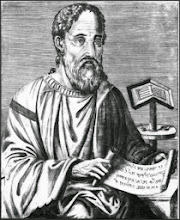Kicking off: The Testimonium et al.
I’m intending to use this blog to discuss several issues having to do with New Testament scholarship and Christian origins in general. My particular area of interest is in source criticism, a field which I interpret fairly broadly to include things like external witnesses to early Christianity, especially Tacitus and Josephus; the Synoptic Problem, where I favor the theory that Matthew used Mark and Luke used Mark and Matthew (i.e., the “Farrer Theory” or “Farrer-Goulder Hypothesis”); the relationship of John and the apocryphal gospels to the synoptics; the sources of Acts, and the issue of what Paul knew or believed about Jesus. Blogging is a new medium for me and I expect the blog will develop in unexpected directions.
I’ve written a good deal on the subject of The Testimonium Flavianum, the paragraph-length synopsis about Jesus found in our manuscripts of Josephus’ Antiquities of the Jews at 18.63-64 (or 18.3.3 in the English text). As this is also the subject of the doctoral dissertation I’m currently working on at the University of Birmingham, it will also be a major focus of this blog. One of the purposes of this blog is to try to keep as much of my on-line writing on the TF as possible in the same place. I hold that the version of the TF found in our manuscripts of the Antiquities is the work of Eusebius of Caesarea in the fourth century and there is no good evidence for the existence of an earlier “Josephan” version underlying the version that has come down to us.
A good bit of what I’ve written on the subject is available online, including these:
I. There is the paper I published in CBQ [K. A. Olson, “Eusebius and the Testimonium Flavianum,” Catholic Biblical Quarterly 61.2 (1999) 305-322]. It is currently available online at:
http://www.findarticles.com/p/articles/mi_qa3679/is_199904/ai_n8831236/pg_1
II. There is a fairly long essay I posted to the Crosstalk2 e-list on July, 29, 2000 with the title “Eusebian fabrications: the testimonium Flavianum” archived as post #4869
http://groups.yahoo.com/group/crosstalk2/message/4869
III. There is a series of posts I sent to Crosstalk2 in Spring-Summer of 2004. Anyone interested in the specific issues relating to the TF addressed in these posts may also wish to look at the other posts in the threads in which they occur. I would recommend especially the posts of Stephen Carlson.
(1) “Josephus”; a few developments of my thinking on the TF since writing the CBQ article; 4/4/4 post#15682
http://groups.yahoo.com/group/crosstalk2/message/15682
(2) “Josephus”, a brief response to some criticisms of my CBQ article made by James N. Carleton-Paget in The Journal of Theological Studies 52 (2001) 539-624; 5/22/4 #16045
http://groups.yahoo.com/group/crosstalk2/message/16045
(3) “The Argument of the TF”; what the author of the TF is saying; 7/27/4 #16158
http://groups.yahoo.com/group/crosstalk2/message/16158
(4) “Agapius’ Testimonium”; traces the genealogy of the 10th century Arabic version of the TF; 7/29/4 #16163
http://groups.yahoo.com/group/crosstalk2/message/16163
(5) “Who Said Jesus Was A Wise Man?”; 7/29/4 #16164
http://groups.yahoo.com/group/crosstalk2/message/16164
(6) “Jerome’s Testimonium”; 7/30/4 #16167
http://groups.yahoo.com/group/crosstalk2/message/16167
(7) “Pseudo-Hegesippus’ Testimonium”; 7/31/4 #16170
http://groups.yahoo.com/group/crosstalk2/message/16170
Finally, Stephen Carlson has posted on the subject of the Testimonium several times on his blog Hypotyposeis. The most recent post, with links to the earlier posts in it, is available at:
http://www.hypotyposeis.org/weblog/2004/12/tacitus-josephus-and-eusebius.html
I expect to be addressing Carlson’s theory that Tacitus is a witness to a pre-Eusebian form of the Testimonium on this blog fairly soon.
Comments are welcome, or at least grudgingly tolerated, as long as they are non-abusive, academic or historical-critical in nature, and reasonably brief. Further definition of the policy on responses will follow.
Best Wishes,
Ken Olson 3/31/5

